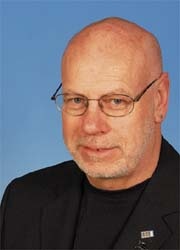Healthcare Fundraising — You will get what you ask for!
Peter's theme and advice for our hospital
management visitors will be
Over many millennia people have supported healthcare in many forms - from the `Good Samaritan´ in the Bible, to the elderly lady who died five years ago in Birmingham and left $1.3 Million to a hospital for Cancer Research.

Peter Fletcher speaks as an expert. His working life began in the motor trade in Australia, but he soon chose to enter a Salvation Army Training College to become a minister, a role in which he gained early experience as a fundraiser. From 1990-92, as Residential Director of the Salvation Armys Red Shield Appeal, in Victoria, he co-ordinated the Annual Doorknock appeal, liasing with the media, undertaking speaking engagements, and much else. All of this resulted in the raising of an astonishing $3,000,000 in both years of his directorship.
In 1992, as Resources Development Officer for the Uniting Church Synod of Victoria, his tasks included managing fundraising appeals for special programmes for overseas aid. From 1995, in succession he worked as Fundraising Manager for the AntiCancer Foundation, Muscular Dystrophy Association and the Royal Adelaide Hospital. During the latter, he instigated an award-winning Major Gift Campaign. This raised around $5,000,000,000 one of the best campaigns of its type seen in Adelaide, Peter himself exclaims. Today Peter Fletcher is Director of Philanthropy at the University Hospital Birmingham Charities in the UK. He is also a frequent speaker at Fundraising Conferences in Canada, America, New Zealand and Australia. Now living in the UK, he is a member of the Institute of Fundraising (UK), Chair of its Midlands Region division, and Chair of its Hospital Special Interest Group. Peter is also a member of the Association for Healthcare Philanthropy (USA) and an associate member of the Association of Fundraising Professionals (USA). Peter was also the founding Programme Director of Madison Down Under; a four-day workshop for Fundraisers based on the Association for Healthcare Philanthropys Madison Institute at Wisconsin, USA: Arguably the best and most intensive fundraising workshop in the South East Asia region, he points out. He also continues to be a welcome participant in other fundraising training courses and workshops.
Healthcare fundraising is nothing new. For hundreds of years before the introduction of the NHS almost every hospital in the United Kingdom was built with ‘Public Subscription’ or Fundraising. Generous individuals gave large and small amounts in support of their local hospital and its mission in their community. Around the globe there is an increasing interest in the amount of involvement that philanthropic donations can have on the bottom line funding of healthcare.
In a world where the cost of technology is often outstripping the capacity of finance managers to pay the bills, hospitals are looking at their communities to support this vital community service. Globally, most hospitals receive donations from grateful patients and relatives; as a thank you or a memory. However, there is a significant need to make this an organized, professional and intentional activity, rather something that is just left to chance that it ‘might’ happen.
Having said that, fundraising principle number one is that it should be more about people than it is about money and the aim of all this activity should be to develop a bond between the organization that needs funds and the people, often grateful patients, who have the ability to support. The most important person in this exchange is not the doctor; it is not the finance manager, or even the CEO or the fundraiser, it is the potential supporter who has the ability to make a gift.
Working in a hospital environment is to work in a place of miracles where every day people are in some form getting their lives back and are grateful to the medics, allied health professionals, healthcare scientists, administration and also the porters and ancillary staff. This ‘good will’ can be turned into significant support for the organization, but it needs to involve everyone.
Fundraisers are not so much raising funds for an organization but involved in creating a change of culture, so that an organization can articulate its needs to a public who are receptive to being asked for support. Fundraising is not just a financial exercise, but an organizational commitment to ‘Change the World’ and giving people an opportunity through their gifts to be part of that change.
* CFRE: Certified Fundraising Executive. FFIA: Fellow of the Fundraising Institute – Australia.
** Details: www.institute-of-fundraising.org.uk
08.03.2007





